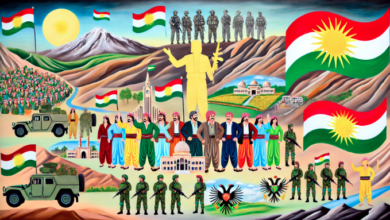“Elections in the Kurdistan Region of Iraq: What’s Next?
The Kurdistan Region of Iraq is at a critical juncture, requiring urgent political, legal, and institutional reforms to secure its future and ensure stability. One of the most pressing issues is the need for a regional constitution, which would serve as the cornerstone for a clear legal framework defining the powers and responsibilities of the region’s institutions. Equally important is the establishment of a regional constitutional court, which would provide a neutral platform to resolve political and institutional disputes, preventing these conflicts from escalating into larger crises.
The Importance of a Constitution:
A constitution is not just a legal document; it is the foundation upon which the political and legal system of any state or region is built. For the Kurdistan Region, drafting a regional constitution is essential for several reasons:
1. Defining Powers and Responsibilities: The constitution will clearly outline the powers of the executive, legislative, and judicial institutions, helping to avoid conflicts over authority between these bodies. This clarity will ensure that institutions work in harmony and prevent power struggles.
2. Strengthening the Rule of Law: A constitution ensures that the rule of law is upheld for everyone, whether individuals or institutions. Without a clear constitution, governance becomes subject to personal interpretations and abuses of power, which can lead to authoritarian tendencies.
3. Separation of Powers: The constitution will guarantee the separation of powers among the legislative, executive, and judicial branches, ensuring that no single group or party can monopolize power. This is vital for fostering democracy and limiting the dominance of one political faction.
4. Protecting Minority Rights: Through a well-defined constitution, legal protections can be put in place to safeguard the rights of minorities and different groups within the region. This is crucial for promoting peaceful coexistence and preventing discrimination or marginalization.
5. Establishing the Constitutional Court: Along with drafting a constitution, the creation of a constitutional court is vital to ensure the proper application of the constitution. This court would be responsible for resolving disputes between political actors and governmental institutions in a fair and impartial manner. Without such a court, political actors might have to rely on Iraq’s Federal Supreme Court, which could have biases or political interests in regional matters.
Unifying the Military: A Step Towards National Stability
Another critical reform needed is the unification of the military forces in the Kurdistan Region. Currently, the region’s military forces, known as the Peshmerga, are divided into two main factions: Unit 70, aligned with the Patriotic Union of Kurdistan (PUK), and Unit 80, aligned with the Kurdistan Democratic Party (KDP). This division reflects deep political loyalties and weakens the region’s national security.
Why a Unified National Army is Essential:
1. Strengthening National Security: A unified, non-partisan military would strengthen the region’s security infrastructure, ensuring that the armed forces are dedicated to protecting all citizens, rather than serving the interests of a particular party or elite.
2. Ending Party Loyalties in the Army: The division of the military along party lines undermines the effectiveness of the armed forces and makes them vulnerable to exploitation in political disputes. A national army, free from political loyalties, would ensure that the military serves the region’s broader national interests.
3. Political Stability: A unified army would reduce tensions between the region’s major political parties, preventing the use of military forces to gain political leverage or pressure rivals.
4. Improving International Relations: A unified national army would enhance the Kurdistan Region’s image as a politically stable and cohesive entity in the eyes of the international community, which could lead to increased political, economic, and military support from foreign powers.
5. Preventing Internal Conflict: The existence of two rival military factions increases the risk of internal conflict if political tensions rise. A unified military would prevent such scenarios, fostering a more secure and peaceful environment.
To secure a more democratic and stable future for the Kurdistan Region, structural reforms are essential. These include drafting a regional constitution and establishing a constitutional court to balance political powers and institutions. Additionally, unifying the region’s military forces is a key step toward achieving national unity and enhancing internal security. These reforms are not merely technical adjustments but are crucial to avoiding political monopolization, preventing internal conflicts, and ensuring a safe and prosperous future for all citizens of the Kurdistan Region.
